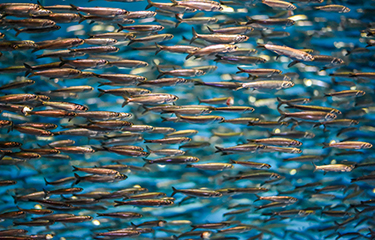Oceana continues to challenge the U.S. government over federal catch limits on anchovy the organization claims ignore scientific advice.
In a statement on Monday, 1 February, the environmental conservation group announced it has filed two legal actions to support what it calls “science-based management” of the northern anchovy stock. The organization has taken NOAA Fisheries to court over anchovy catch limits multiple times over the past few years, and alleged in 2019 that it had failed to protect the anchovy stock in Northern California.
On Friday, Oceana filed a motion in U.S. District Court in the Northern California District asking U.S. District Judge Lucy Koh to find the government in contempt and order the government to comply with her 2020 order that the catch limits violated the Magnuson-Stevens Act.
In a second filing, Oceana challenged NOAA Fisheries regulations it posted on 31 December, 2020. The group claims that rather than fixing the rules, federal officials chose to repeat them.
NOAA Fisheries’ “near-fanatical determination to ignore science and maintain a fishery management approach this court has explicitly held unlawful displays a troubling disregard for the rule of law and harms a species that is vital to West Coast coastal communities and marine ecosystems,” the second suit states.
Last September, Koh ruled that NOAA Fisheries maintained a hard catch limit on anchovy despite knowing that the population can vary wildly from year to year. That ruling followed another ruling in 2018 that found the anchovy catch limit illegal. Despite those rulings, NOAA Fisheries set the limit at 25,000 metric tons.
NOAA Fisheries has argued that it lists the anchovy as a “monitored” stock. As a result, it does not base catch limits on annual surveys. Rather, the catch limit is set at a quarter of the stock’s overfishing limit.
Earthjustice filed the suits on behalf of Oceana.
“Fishing communities and local economies rely on abundant populations of anchovy and other forage fish as critical food for larger fish like salmon as well as whales, sea lions, and other ocean wildlife that bring tourism dollars to our coasts,” Oceana California Campaign Director and Senior Scientist Geoff Shester said. “We’re hoping that as a new administration looks to restore a science-based approach by its agencies, they finally implement rational management of anchovy off the U.S. West Coast to increase the resilience of our oceans in the face of climate change.”
Photo courtesy of David A. Litman/Shutterstock







